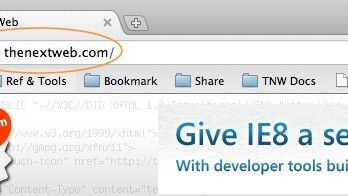
So you know how Google Chrome is supposedly all about simplicity and speed? Well it’s just taken that minimalist mindset a step further.
In Google’s developer version of Chrome, you’ll notice that the http:// in URLs is there no more. Typing in any URL, e.g. https://thenextweb.com will reveal this:

As opposed to:

Might seem like common sense, after all to your average user including http:// simply adds to the complexity of typing in a web address. For developers however, it’s a different story. Many are not pleased.
Many developers have raised the issues you would assume Google had already considered:
First, what happens in other cases for example where the scheme is https or FTP? Google’s solution is to show those schemes in those cases.
The second concern raised was what happens when copying the URL from Chrome and pasting into another browser that requires the http:// scheme? Google’s solution, your clipboard should automatically still grab the http:// part, we just don’t reveal it. And it’s true, copying a URL from Chrome over to anywhere else will reveal the the http:// as normal.
It’s an interesting move and one that is likely to have other browsers take notice and eventually do the same, after all the most people http:// is just something that they’ve grown used to including and seeing rather than anything they understand.
The biggest question, as OS news; rightfully points out, lies in its implementation and whether other browsers follow Google’s lead and hide in exactly the same manner. If a standard isn’t set, we’ll be left with each browser doing this in their own way and leaving the average user more confused than ever.
Personally? Good riddance.
Get the TNW newsletter
Get the most important tech news in your inbox each week.




